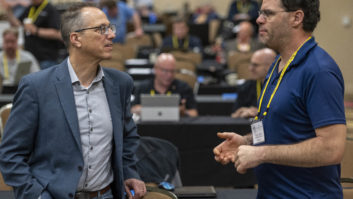The current talk over the water cooler at radio stations is the prediction of the demise of AM, with carmakers removing AM reception from many new vehicles. We hear about station owners choosing to sell their antenna sites because the real-estate value is higher than the short-term value of the broadcast station. High-power stations are diplexing with others and coverage is suffering. AM stations that have FM translators are promoting the FM frequency with no mention of the AM frequency.
The broadcast industry is killing AM.
Recently I purchased a new car. Yes, it has HD Radio. Yes, it plays streams while connected to a phone. Here are my observations:
The auto dealership was not knowledgeable about HD Radio. Its staff did not know or care that there are stations in digital.
When they were showing me the car, the radio kept buffering. When I mentioned this to one of the mechanics, he recommended turning off the HD. Yes, analog won. When I was then shown the apps that play streams, we noticed that the analog radio playing music sounded superior to the stream.
It’s a shame that the public is not aware of what they already have. The reason streams are popular is not for the fidelity (though they could sound better). It is the program diversity of the streams that magnetically attracts listeners from broadcast.
Yet stations rarely promote their streams; it’s almost as though they don’t exist. Many stations are simulcasting their over-the-air programming yet not promoting this reception route to the audience.
For many years we’ve heard these stations promote themselves as content providers yet they don’t manage their multiple distribution points. Public radio has discovered this and is being very successful with its digital strategies; why can’t commercial radio learn? Instead we see companies selling off once-dominant stations for bargain-basement prices.
I know, this is something of a rant. But consider that while AM is on the fast decline, FM is slowly going too. Why do we need radio stations that don’t serve the public? Most small and medium-market FMs lack local hosts; their poorly scripted liners are read by the same talent in multiple markets. Many stations are also not equipped to handle local news stories or information about developing emergencies or even have a physical local presence. Stations are cutting costs by not having talent.
[Read more stories about the future of AM radio in cars]
What’s next? Are we going to listen to radio hosted by artificial intelligence? Was Max Headroom a prophecy? Shame on the large radio conglomerates that promised us they were going to be hyper local and beneficial for our industry and our communities.
So it feels like radio is almost dead.
How can it be saved?
Some in Congress have proposed that AM should be mandatory in cars. Great.
But can they do anything to assure that the AM radio will be a quality one, not narrow-band?
Will local communities suddenly have AM stations broadcasting for their community interest? Or will it be syndicated talk or a relay of religious programming that originates from far away?
Well let’s try to have a positive attitude. Can AM sound good? Yes, HD Radio can sound good, but while we’re theoretically deprecating the radios that have existed for over a hundred years, why not relook at AM.
How about creating a less crowded band by removing stations with power below 20 kW?
What if we adopted Digital Radio Mondiale? The broadcasts could go far and sound pristine.
More practically, why don’t we teach our staffs to evangelize AM? Emphasizing that it is free, that it can go farther, that it can be clear when handled properly.
And let’s learn from the mistakes of the past. We jam-packed the AM band, forcing narrow-band broadcasting, and guess what, now we’re doing the same to FM with its repeaters and translators.
Broadcasters, both AM And FM, need to remember that their content can be sent over a stream encoder as well as a transmitter, and make the stream part of their promoted identity. And most of all, they need to think locally.
Is it too late for that?
Comment on this or any article. Submit letters to [email protected].










